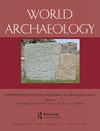Food as affirmative biopolitics at the border: liminality, eating practices, and migration in the Mediterranean
IF 1.8
2区 历史学
0 ARCHAEOLOGY
引用次数: 4
Abstract
ABSTRACT Based on long term archaeological ethnography on the border island of Lesvos situated on Europe’s margins, this article explores the regimes of eating and the role of food practices in the refugee camp/processing centre of Moria. Starting from the double liminality of eating and border-crossing, it outlines and juxtaposes two regimes of corporeal life. The first is the biopolitical arena of official food provision as produced by the border apparatus and the logic of humanitarian governmentality. This regulates border-crosser’s time and daily routines and renders them ‘people of concern’, tress-passers or victimized individuals with no agency. The second is the affective, trans-corporeal, multi-sensorial field of cooking, eating, making kin, making community. It is produced through the agency of border-crossers themselves, when they take charge of their own eating. In doing so, they constitute eating in these liminal conditions as affirmative biopolitics, as the affirmative politics of life and hope.食物在边境作为积极的生物政治:阈限,饮食习惯,和移民在地中海
基于对位于欧洲边缘的边境岛屿莱斯沃斯的长期考古人类学研究,本文探讨了莫里亚难民营/加工中心的饮食制度和食物实践的作用。它从进食和跨越边界的双重阈限出发,勾勒并并列出两种物质生活的政体。第一个是由边境机构和人道主义治理逻辑产生的官方食品供应的生物政治舞台。这规定了越境者的时间和日常活动,使他们成为“受关注的人”、过境者或没有机构的受害者。第二个是情感的、跨肉体的、多感官的领域,如烹饪、饮食、建立亲属关系、建立社区。它是通过越境者自己的代理产生的,当他们负责自己的饮食时。在这样做的过程中,他们将这些有限条件下的饮食构成了积极的生命政治,作为生命和希望的积极政治。
本文章由计算机程序翻译,如有差异,请以英文原文为准。
求助全文
约1分钟内获得全文
求助全文
来源期刊

WORLD ARCHAEOLOGY
ARCHAEOLOGY-
CiteScore
2.60
自引率
0.00%
发文量
32
期刊介绍:
World Archaeology was established specifically to deal with archaeology on a world-wide multiperiod basis. Thirty years after it was founded it remains a leader in its field. The first three of the year"s quarterly issues are each dedicated to a particular theme of current interest. The fourth issue, Debates in World Archaeology, is a forum for debate, discussion and comment. All papers adopt a broad comparative approach, looking at important issues on a global scale. The members of the editorial board and the advisory board represent a wide range of interests and expertise and this ensures that the papers published in World Archaeology cover a wide variety of subject areas.
 求助内容:
求助内容: 应助结果提醒方式:
应助结果提醒方式:


